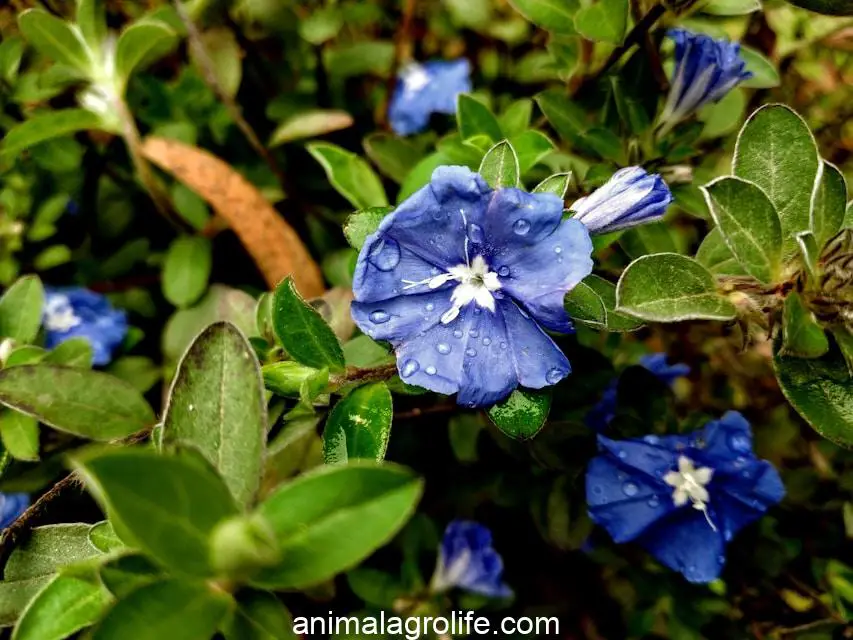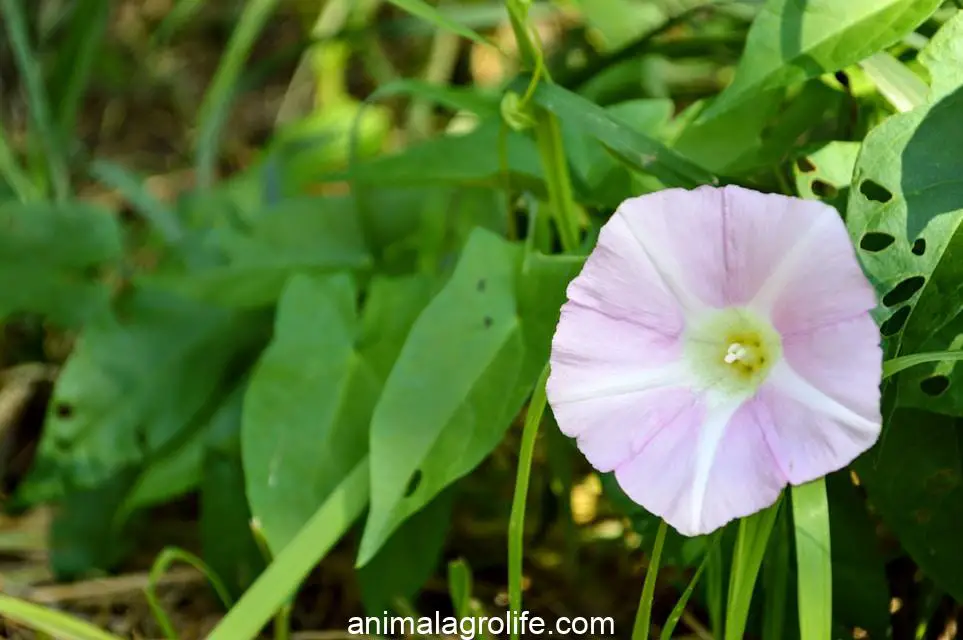Chickens are curious creatures. They love exploring their surroundings and pecking at all sorts of new things. If you’ve got chickens and a yard with flowers, you might be wondering “Are morning glories poisonous to chickens?” That’s a smart question because the simple answer is yes, morning glories can be harmful to your feathered friends.
jump to the topic
The Morning Glory Plant
Morning glories (Ipomoea spp.) are flowering plants that belong to the Convolvulaceae family. They are known for their trumpet-shaped flowers that bloom in various colors, including purple, pink, blue, and white. Morning glories are annual or perennial vines that can quickly climb and cover fences, trellises, and other structures.
Types of Morning Glories
There are several species of morning glories, but the most common ones include:
- Ipomoea purpurea: Also known as common morning glory, it is a popular garden plant with heart-shaped leaves and large, showy flowers.
- Ipomoea tricolor: Often referred to as heavenly blue morning glory, it is known for its sky-blue flowers and dark green leaves.
- Ipomoea nil: This species is commonly called Japanese morning glory and features flowers in various colors, including red, pink, and purple.

Are Morning Glories Poisonous to Chickens?
While morning glories are not considered highly toxic to chickens, certain parts of the plant contain compounds that can be harmful if ingested in large quantities. The seeds of morning glories, in particular, contain ergoline alkaloids, such as lysergic acid amide (LSA), which can have psychoactive effects on animals.
Potential Risks
Chickens are generally cautious when it comes to consuming toxic plants. However, there are a few potential risks associated with morning glories:
- Ingestion of Seeds: If chickens consume a large number of morning glory seeds, they may experience digestive issues, including diarrhea and vomiting.
- Psychoactive Effects: The ergoline alkaloids present in morning glory seeds can have hallucinogenic effects on animals. While chickens are less likely to be affected due to their different brain chemistry, it is still advisable to prevent excessive consumption.
Expert Opinions
According to Dr. Michael Darre, a poultry specialist at the University of Connecticut, “While morning glories are not highly toxic to chickens, it is best to prevent them from consuming large quantities of seeds. Chickens are generally good at avoiding toxic plants, but it’s always better to err on the side of caution.
Preventing Chickens from Consuming Morning Glories
As a chicken owner, it is essential to create a safe environment for your flock and take necessary precautions to prevent them from accessing potentially harmful plants. Here are some steps you can take to keep your chickens away from morning glories:
1. Secure the Chicken Run
Ensure that your chicken run is securely fenced to prevent chickens from wandering into areas where morning glories may be growing. Use chicken wire or hardware cloth to create a barrier that is difficult for them to breach.
2. Regularly Inspect the Coop and Run
Regularly inspect your chicken coop and run for any morning glory plants that may have sprouted. Remove them promptly to prevent your chickens from coming into contact with the plant or consuming its seeds.
3. Provide Sufficient Forage and Feed
Chickens are less likely to seek out potentially harmful plants if they have access to a well-balanced diet and sufficient forage. Ensure that your chickens have access to a nutritionally complete feed and provide them with plenty of fresh greens and other safe foraging options.
4. Distract with Alternative Plants
Planting chicken-friendly vegetation, such as grasses, herbs, and vegetables, can help divert your chickens’ attention away from potentially harmful plants like morning glories. This will provide them with safe and nutritious options to peck at.

How harmful are they?
Eating a few morning glory leaves or flowers probably won’t do a lot of harm to your chickens. But the seeds – those are the main problem. These seeds contain something called lysergic acid amide, which has effects like some strong medicines. It can cause problems like:
- Stomach upset and diarrhea
- Acting weird or confused
- Changes in how much they eat or drink
- Seeming weak or wobbly
Some Other Plants That Are Harmful to Chickens
Morning glories aren’t the only plants you need to keep your chickens away from. Here are some other plants that are also toxic to chickens:
- Daffodils: These cheerful yellow flowers might look harmless, but they’re poisonous to chickens, especially the bulbs.
- Azaleas and rhododendrons: These beautiful flowering shrubs can cause serious issues as well. If chickens eat parts of these plants, they might experience heart and breathing trouble.
- Nightshade: This family of plants includes tomatoes, potatoes, and eggplants. While the ripe fruits and veggies are safe, the leaves stems, and unripe parts can be trouble for chickens.
- Foxglove: Those elegant tall flowers with purple, pink, or white bell shapes are very pretty to look at but contain chemicals that can mess up a chicken’s heart.
It’s always better to be safe than sorry. If you’re not sure whether a plant is safe, assume it isn’t!

Do Chickens Instinctively Know Which Plants Are Toxic?
Chickens are known to peck at a wide variety of things, both edible and not. You might think that they have a natural sense of avoiding plants that are bad for them, but unfortunately, that’s not always true. Sometimes, if chickens are bored or don’t have enough good food, they might try nibbling on things they shouldn’t. Chickens are curious peckers by nature!
Plant Toxins and “Water Belly”
Sometimes, if your hen eats something mildly poisonous, she might develop a condition known as “water belly” or ascites. This is when fluid builds up in her belly, making her look swollen. It might just be a side effect of something she ate, or it could be a symptom of more serious trouble. If you think your chicken has a water belly, it’s important to take her to a vet who treats birds.
Morning glory on the chicken coop
You might think it would be pretty to have morning glories climbing all over your chicken coop. Unfortunately, though, it’s not a great idea. Remember, curious chickens like to peck at anything and everything. You don’t want to present a poisonous snack right in their space.
Is wisteria toxic to chickens?
Yes, wisteria is another plant that can be bad for chickens. Wisteria is a beautiful vine with gorgeous hanging purple flowers. It gives amazing shade, but the seeds are toxic. Even a couple of seeds can cause problems for chickens.
Is morning glory toxic to birds?
Morning glories aren’t only bad for chickens. They can be harmful to many wild birds too. The good news is that most birds have a bit more sense and avoid eating the toxic seeds, but you still need to be careful if you have bird feeders close to where morning glories are growing.
Are Morning Glories toxic?
Yes, morning glories are considered toxic plants. Even humans shouldn’t go munching on them! That’s because of those seeds that we keep talking about – they’re the worst part.
Are Morning Glories poisonous to farm animals?
Morning glories don’t just affect chickens – they can be toxic to other farm animals too. Cows, horses, goats, and sheep can all experience similar problems if they eat too many morning glory seeds.
First Aid for Poisoning
If you suspect your chicken has eaten morning glory seeds, here are a few immediate steps you can take:
- Freshwater: Provide your chicken with plenty of fresh, clean water to help dilute any toxins.
- Observation: Try to determine roughly how many seeds your chicken may have eaten. This information will be important for your veterinarian.
- Contact a Veterinarian: Don’t delay in contacting a vet who specializes in birds or farm animals. They’ll be able to advise you on the best course of action and whether your chicken needs professional care.
Specifics about the Toxin
The toxic chemical in morning glory seeds is called lysergic acid amide (LSA). It’s a compound similar in structure to LSD, a well-known hallucinogenic drug. In chickens, LSA can cause:
- Gastrointestinal Issues: Nausea, vomiting, and diarrhea.
- Neurological Effects: Disorientation, hallucinations, weakness, and changes in behavior.
- Other problems: Potentially, LSA may affect a chicken’s heart rate and breathing in severe cases.
Alternative Plants
Want the beauty of a flowering vine without the risk to your chickens? Here are some safer, chicken-friendly alternatives to morning glories:
- Nasturtiums: These come in beautiful bright colors and have edible flowers.
- Honeysuckle: A classic choice with gorgeous blooms and a sweet fragrance. (Note: Be sure to choose a non-invasive variety).
- Passionflower: This vine produces stunningly unique flowers and edible fruits for both you and your chickens!
- Clematis: Offers a huge array of flower colors and shapes, giving you tons of options.
FAQs about Are Morning Glories Poisonous to Chickens
Are moonflowers poisonous to chickens?
Yes, moonflowers, similar to morning glories, are considered toxic to chickens. Their seeds contain harmful chemicals. It’s best to keep chickens away from these plants.
Are morning glories safe for animals?
No, morning glories are not safe for most animals. The seeds, in particular, contain a substance that can cause unpleasant symptoms ranging from stomach upset to more serious health issues.
Is morning glory toxic to livestock?
Yes, morning glories are also toxic to livestock like cows, goats, sheep, and horses. Ingesting these plants can lead to health problems for them as well.
Can birds eat morning glory seeds?
While birds generally have a better instinct about avoiding toxic plants, it’s still not a good idea to let birds eat morning glory seeds. It’s safer to keep these plants away from bird feeders or areas where birds frequent.
What animal eats morning glory leaves?
Some insects, like particular types of beetles and moths, may eat morning glory leaves. However, most animals will avoid them due to the potentially harmful compounds in the plants.
Final Thoughts About “Are Morning Glories Poisonous to Chickens?”
So, are morning glories poisonous to chickens? Yes, they can be. It’s a good idea to play it safe and remove any morning glory plants from your chicken’s environment. Here are a few tips to protect your chickens:
- Be aware: Know the different plants that are toxic to chickens and double-check if you have any growing in your yard.
- Fence it off: If you can’t get rid of the plants completely, fence them off, so your chickens can’t reach them.
- Provide good food and entertainment: A balanced, healthy diet and fun things to do in their coop and run will make chickens less tempted to nibble on things they shouldn’t.
- Pay attention: Keep a close eye on your chickens’ behavior. If you notice anything unusual after they’ve been exploring your yard, it’s good to get advice from a vet.
While morning glories are beautiful to look at, it’s better to admire them from afar when it comes to your chicken flock. By being careful and making a few adjustments, you can enjoy these lovely blooms while ensuring your feathery friends stay safe and healthy!
Resources
- ASPCA Toxic and Non-Toxic Plant List: https://www.aspca.org/pet-care/animal-poison-control/toxic-and-non-toxic-plants
Important Note: Always consult with a qualified veterinarian if you have any concerns about your chicken’s health and well-being.










